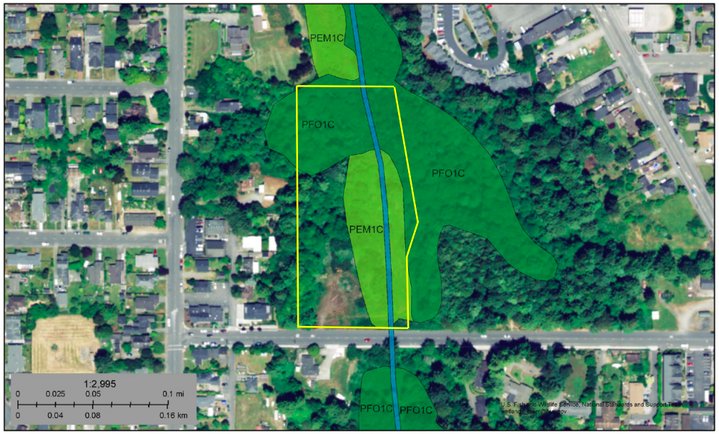

Humboldt County Planning Commissioner Kevin McKenny has been cited for allegedly violating federal, state and local environmental rules on a parcel just outside Eureka city limits. | Image courtesy U.S. Fish & Wildlife Service.
Humboldt County Planning Commissioner Kevin McKenny likely violated the federal Clean Water Act, the California Water Code and other environmental regulations last fall when he conducted unauthorized construction activity on a 4.5-acre parcel he owns just outside Eureka city limits, according to a Notice of Violation from the North Coast Regional Water Quality Control Board.
The notice, issued January 9, says that during an inspection of the parcel this past November, staff from the water board and the U.S. Army Corps of Engineers found that grading had been done to the floodplain; riparian vegetation had been removed; slash and waste had been pushed into riparian areas; and a drain with least three underground outfall pipes had been installed without proper authorization.
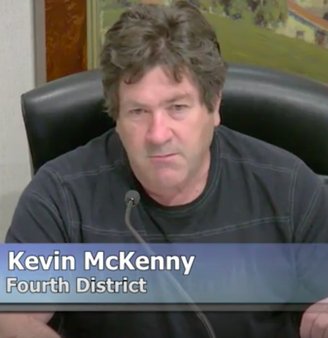
Screenshot from Humboldt County Planning Commission meeting.
Reached by phone on Thursday, McKenny said, “In basic terms, I made a mistake there.”
He said he didn’t realize he needed a permit to install the drainpipe, and in a follow-up email he wrote, “When I was directed to stop work I did and we will cooperate with the State’s Order to rectify my mistake.”
However, Brendan Thompson, an environmental scientist with the regional water board, told the Outpost that McKenny hasn’t exactly cooperated over the past six months as the agency has been asking him to come into compliance.
The water board’s January notice to McKenny reflects a certain level of frustration with his apparent lack of effort:
“The Regional Water Board directed you in a letter dated October 6, 2017, to file a Notice of Intent (NOI) for coverage under the Construction General Permit. As of the date of this letter, you have not done so.”
That remains the case as of yesterday afternoon, Thompson said. McKenny finally contacted the Regional Water Board on Wednesday, two days after the Outpost began investigating the issue. “That’s the first time we’d ever spoken with him,” Thompson said.
The full extent of the alleged violations remains to be seen. McKenny said that in addition to the drainpipe he cleared brush from the property in an effort to push out a “tremendous amount” of homeless campers who showed up following the mass evictions at the Palco Marsh, aka Devil’s Playground, in 2016.
“They moved in,” he said. “They even had wood stoves in their tent. You’ve never seen anything like it.” When he cleared the brush off his property, the homeless folks left, though McKenny said he took no pleasure in it. “It’s not like you really want to go down and be the bad guy,” he said. “That one was difficult.”
The Regional Water Board noted in its report that dredged or “fill” material has been piled up on the property and some of it may have been discharged into “waters of the state.” But McKenny said the fill material has been on his parcel since the late 1970s or early 1980s, when it was put there by the National Guard. (The property, located at 2725 Lucas Street, near Myrtle Avenue, was once slated to be the home of a Boys & Girls Club House.)
Last fall, McKenny and his contractors were doing trenching in order to conduct an engineered soils report, hoping to “discover the extent and location of the historic fill” on the property, McKenny explained in an email. “I did not realize that I needed permits for that aspect of the investigation and that was a mistake on my part.”
During our phone conversation McKenny insisted that none of the work he’s done on the parcel has caused any pollution to state waters.
“There’s just absolutely nothing dirty about what we did,” he said. “There was never dirt going into the creek.”
However, last fall’s inspection report from the Regional Water Board, prepared by Thompson, suggests that there may indeed have been environmental damage done to the property, and the damage could continue as a result of the changes made to the soils, vegetation and hydrology.
From the report:
At least three underground pipes were installed throughout the site, but likely more, which likely will alter the hydrology to eliminate or otherwise negatively impact wetland soil conditions … .
The report also notes that “the entire parcel showed indications of recent disturbance.” It looked like heavy equipment had been used for trench excavation and grading, and “earthen material” had been pushed into wetland areas, according to the report.
Photos document some of the inspectors’ observations.
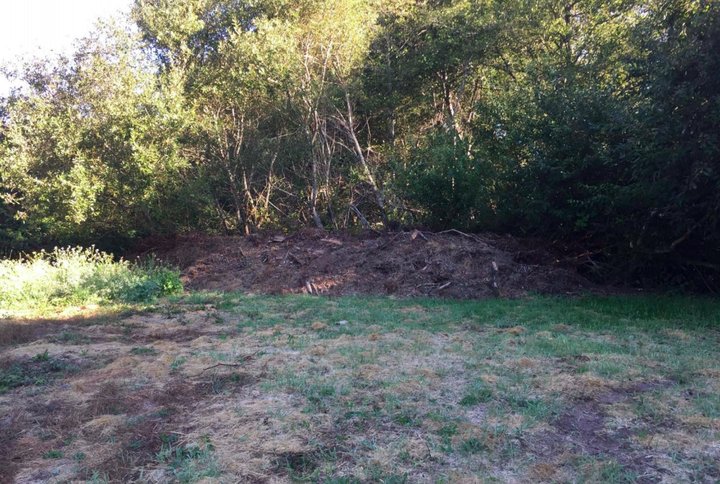
This and the below images come from inspection report from the North Coast Regional Water Quality Control Board.
The above photo, for example, shows a pile of debris found on the northern end of the parcel. Thompson estimated it to be 50 feet long, 20 feet wide and five feet high, and he said it had been pushed into the riparian zone of a slough, called Third Slough, that’s present on the property. The debris in the pile was mostly woody vegetation and dirt but it also contained pieces of asphalt, concrete, brick and nylon twine, according to the report.
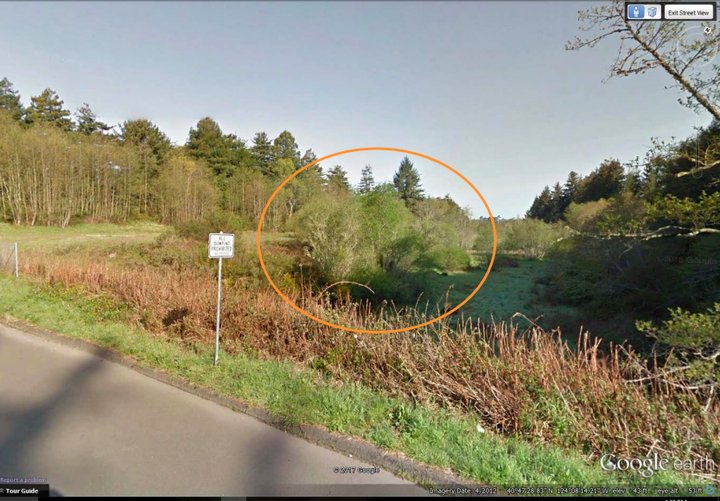
Thompson compared the conditions on the property to the 2012 Google Street View image above and noted that the vegetation that’s circled in orange wasn’t there anymore. And the vegetation on the right side of the creek, in this photo, doesn’t extend as far into the waterway anymore.
Below is a photo of the vertical pipe that was installed:
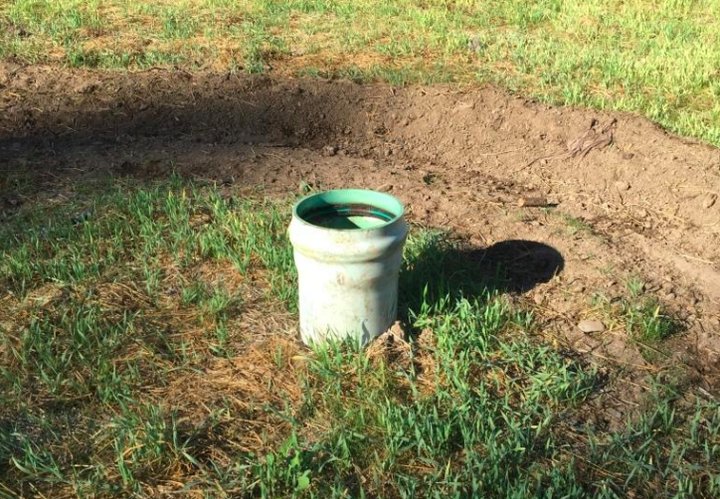
Image courtesy NCRWQCB.
Inside Thompson could see the ends of three horizontal pipes at different elevations. These pipes appeared to run underground and eventually drain into forested wetland and Third Slough.
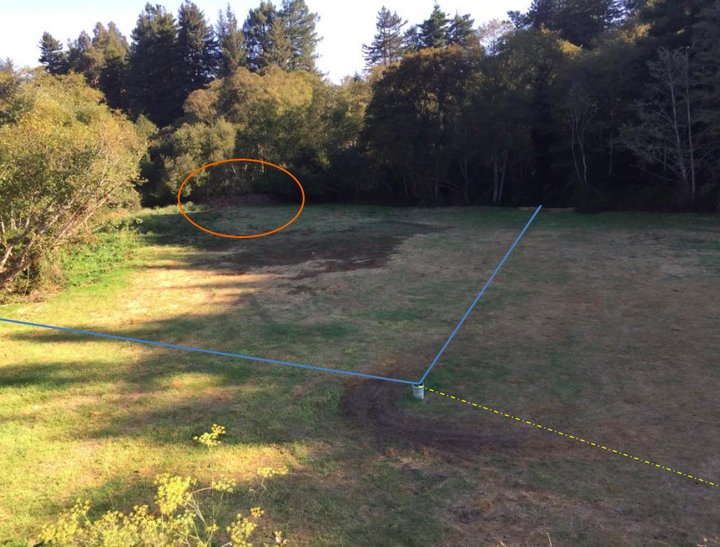
Elsewhere Thompson found two other plastic pipes — black, perforated and wrapped in filter fabric — sticking out of the ground.
Along the western edge of the property Thompson saw an earthen ramp that, based on comparisons with Google Earth imagery, appeared to have been cleared of forested vegetation. In the caption that accompanies the photo below he says it looked like earth had been “graded adjacent to and/or into” the wet forested area you see on the right in the photo.
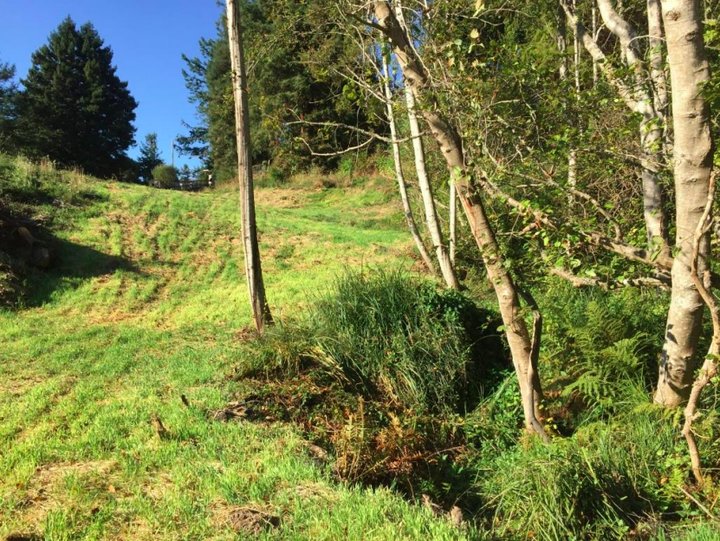
Throughout the report — and again in our conversation — Thompson stressed the need for additional investigation.
“We really need more information from him,” Thompson said of McKenny. The water board will soon release an additional enforcement action requiring McKenny to provide that information, as prepared by a qualified professional. The regional water board may then “take a closer look [and] make our own assessment,” Thompson said.
The Regional Water Board could wind up issuing a Cleanup and Abatement Order and require a technical report, among other options.
This isn’t the first time McKenny has run afoul of regulatory agencies. When Humboldt County Fourth District Supervisor Virginia Bass first appointed him to the planning commission in 2014 McKenny faced public scrutiny over his management of the Eureka property that, at the time, hosted the dilapidated and boarded-up corpse of The Downtowner Motel. (The property has since been renovated to include “The Lodge at Eureka,” a senior housing facility).
Eureka’s chief building official, Brian Gerving, told the Outpost at the time that nearly a decade into the city’s attempts to get the blighted property remediated, McKenny continued to miss deadlines and ignore correspondence. He only complied after city staff sent a letter threatening to pursue “all legal remedies including civil and criminal,” Gerving said.
Bills and other correspondence the city sent to McKenny’s post office box in Cutten were regularly returned to the city stamped refused or unclaimed:
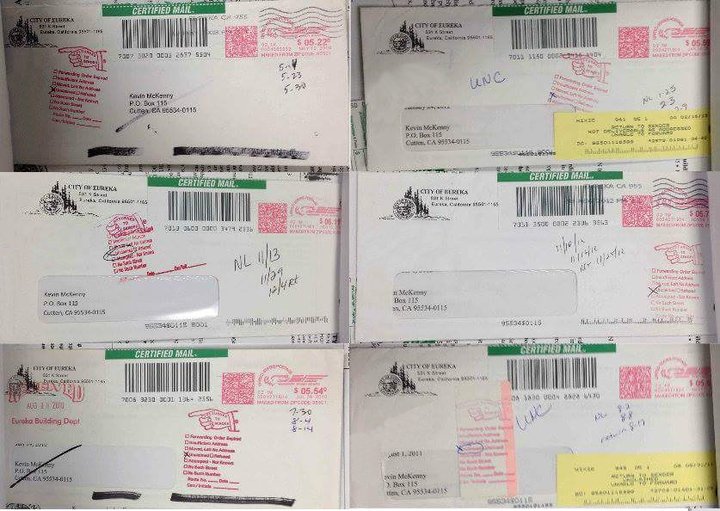
This is the same P.O. box where the Regional Water Board sent their Notice of Violation in January.
Asked why he hadn’t filed the paperwork requested by the water board more than six months ago McKenny said, “I had hired people to do it; it just didn’t get done. I’ve got another person now working on it [now].”
The Outpost reached out to Supervisor Bass for comment, and she responded via email Thursday afternoon, saying, “Mr. McKenny contacted me this afternoon in regards to the situation. I am reaching out to the water board to get their take on what happened as I think that is an important component of the conversation.”
We had yet to hear back from her by the time this post went up.
How could a county planning commissioner not know what’s required before doing construction on his county property? And how could he fail to respond to official correspondence for so long?
“Like I said, I made a mistake,” McKenny responded. “It’s that simple.”
# # #
CLICK TO MANAGE